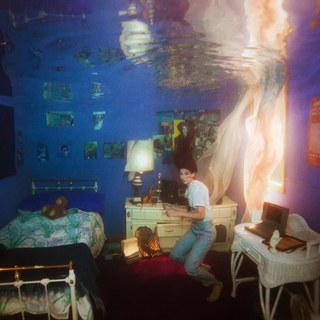
New Music: Weyes Blood
By Troy Hasselman, April 13 2019 —
While nostalgia has always played a role in singer-songwriter music, it seems to have grown as a trend over the last few years. From Frank Ocean’s mining of his own past on 2016’s Blonde to the musical inspiration Sharon Van Etten took from ‘80s soft rock on this year’s Remind Me Tomorrow, singer-songwriters now more than ever look closely at the past as a model for their sound.
Mining the past is certainly not a new musical concept and critics have been mourning “the death of originality” for decades now, but as of late this nostalgia has almost had an apocalyptic sentiment to it. Artists aren’t just mourning a past where their lives seemed simpler — they’re mourning a past where the whole world seemed simpler.
On Titanic Rising, Natalie Mering — better known as Weyes Blood — takes an apocalyptic trip through her own past. The album touches on the ephemeral nature of all things good and bad, the way we can look to the past to hide from our current problems and the way we spend our entire lives coming to grips with our past. These universal themes are filtered through their own modern context with climate change, the inescapability of technology, dating apps and the struggle to find hope in these difficult times all playing a role.

The music itself veers towards an approach that pays owes a debt to the sun-baked California folk-rock of Neil Young, Joni Mitchell and Harry Nilsson. These influences are all filtered through a minor key — paranoia — that manages to sound soaring through the added orchestral and organ instrumentations recalling the duet albums of Nancy Sinatra & Lee Hazlewood. The album also uses electronic instrumentation such as the icy, Blade Runner-style synthesizers that move the instrumentation on the album beyond mere revivalism of the Golden Age of late-’60s and early-’70s singer-songwriter music. These influences give Titanic Rising an aura that doesn’t sound dejected but rather gives the album a desert-trip feel that adds romance to the melancholy subject matter.
Album highlight “Andromeda” typifies the sound of this album through its droning backing track that is supported by country flourishes like slide guitar and a steady, sparse rhythm that her voice cuts through. The track’s lyrics take a look at what appears to be a past relationships and deals with the difficulties of finding lasting love through the barrage of options for new people and experiences we have with new technology at our disposal.
The experimental nature of Weyes Blood’s songwriting is shown through tracks like “Movies” which begins with a solitary, dystopian sounding synth-loop before eventually exploding into a propulsive violin riff that brings the song to its crescendo. These experimental, risk-taking uses of rhythm and instrumental switches combined with her singer-songwriter sensibility Weyes Blood sets apart from her contemporaries and gives her a sound that is, dare I say it, original.
That is not to say this is a perfect album. The singular, sunshine-goth sensibility of the album is certainly unique but can begin to tether together upon repeated listens as tracks can blend into one another and give the record a feeling of sameness in parts.
Still, Titanic Rising marks an artistic leap forward for Weyes Blood and establishes her as an exciting, innovative songwriter who is willing to take risks and place her music within its own unique realm.
